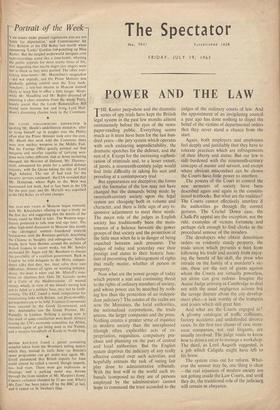POWER AND THE LAW
-1-` HE Keeler peep-show and the dramatic 1 series of spy trials have kept the British legal system in the past few months almost continuously before the eyes of the news- paper-reading public. , Everything seems much as it must have been for the last hun- dred years—the jury system which operates rest of it. Except for the increasing sophisti- cation of criminals and, to a lesser extent, of jurors, a nineteenth-century judge would find little difficulty in taking his seat and presiding at a contemporary trial.
But appearances are deceptive; the forms and the formulae of the law may not have changed but the demands being made by twentieth-century society upon the legal system are changing both in volume and character, and there is little sign of any re- sponsive adjustment to meet these needs. The major role of the judges in English society has traditionally been the main- tenance of a balance between the power groups of that society and the protection of the little man when he is in danger of being crunched between such pressures. The judges of today and yesterday owe their prestige and status to their historic func- tion of preventing the infringement of rights that really matter, whether of person or property.
Now what are the power groups of today which present a real and continuing threat to the rights of ordinary members of society, and whose power can be matched by noth- ing less than the protection of an indepen- dent judiciary? The estates of the realm are now the Ministries, the local authorities, the nationalised corporations, the trade unions, the larger companies and the press. Nothing creates a greater sense of injustice in modern society than the unexplained (though often explicable) acts of ex- propriation, requisition, compulsory pur- chase and planning on the part of central and local authorities. But the English system deprives the judiciary of any really effective control over such activities, and hopefully entrusts the task of seeing fair play done to administrative tribunals. With the best will in the world such tri- bunals (composed as they are of persons employed by the administrator) cannot hope to command the trust accorded to the judges of the ordinary courts of law. And the appointment of an invigilating council a year ago has done nothing to dispel the belief of the victims of departmental orders that they never stand a chance from the start.
Again, both employers and employees feel deeply and justifiably that they have to tolerate practices which are infringements of .their liberty and status. But our law is still burdened with the nineteenth-century cOncepts of master and servant, and except where obvious misconduct can be shown the Courts have little power to interfere.
The powers of the Court to control the new monsters of society have been described again and again in the constitu- tional textbooks. But what are the realities?
The Courts cannot effectively interfere if the authorities go through the correct gestures. The Crichel Down case, the Chalk-Pit appeal are the exception, not the rule, examples of victims fortunate and perhaps rich enough to find chinks in the procedural armour of the invaders.
The developers who obtain demolition orders on evidently sturdy property, the trade union which prevents a man from following his trade and society from enjoy- ing the benefit of his skill, the press who intrude on the family of a murderer's vic- tim, these are the sort of giants against whom the Courts are virtually powerless, yet alone can give redress. Imagine the Assize Judge arriving at Cambridge to deal not with the usual negligence actions but the savage dispute about the city develop- merit plan--a task worthy of the trumpets and posies which. still greet him.
And what are the Courts engaged, in? A gloomy catalogue of traffic collisions, factory accidents and undefended divorce cases. In the first two classes of case insur- ance companies, not real litigants, are usually involved. The judge needs to know how to drive a car or to manage a workshop. The third, as Lord • Asquith suggested, is a job which Caligula might have left to his horse.
The system cries out for reform. What- ever the answer may be, one thing is clear —the real injustices of modern society are not getting inside the Law Courts, and until they do, the traditional role of the judiciary, will remain in abeyance.






























 Previous page
Previous page